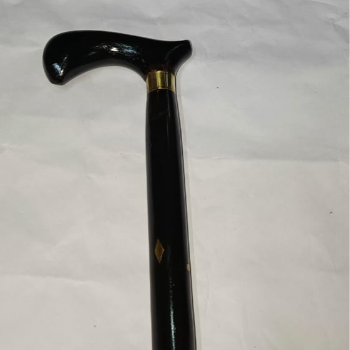In the bustling streets of Jaipur, where vibrant colors and the aroma of mouth-watering street food fill the air, lives a remarkable woman named Anjali. Anjali, in her late 50s, has always been a pillar of strength for her family. However, life threw her a curveball when she started facing mobility issues due to arthritis. The city that once seemed like a playground now felt like a maze she couldn't navigate.
For Anjali, the thought of losing her independence was daunting. She cherished her morning walks to the local temple, the joy of shopping in the bustling bazaars, and the simple pleasure of an evening stroll with her grandchildren. But now, even a short walk to the local grocery store seemed like a Herculean task. It wasn't just about the physical pain; it was the emotional toll of feeling dependent and restricted.
This is where the beautifully crafted walking stick entered the picture. It wasn't just any walking stick; it was a symbol of hope, independence, and dignity. Made from exquisite wood, with intricate designs that reflect Indian craftsmanship, this walking stick was not only a functional aid but also a piece of art that Anjali could proudly carry.
Anjali's experience is not unique. Many individuals in India, particularly the elderly, face similar challenges. According to a study by the Arthritis Foundation of India, over 15 million people are affected by arthritis, impacting their mobility and quality of life. The problem isn't just confined to physical pain; it's about the emotional distress of losing one's independence and the fear of becoming a burden.
The walking stick solved a major practical issue for Anjali – it provided the support she needed to walk comfortably and confidently. But beyond that, it addressed a deeper emotional need. It gave her back the confidence she lost and the freedom she craved. With her walking stick, Anjali was once again able to partake in her daily activities, from visiting the temple to enjoying the vibrant festivals that Jaipur is known for.
The story of Anjali is a testament to the impact that a simple tool like a walking stick can have. It's about more than just physical support; it's about restoring faith in one's abilities and reclaiming one's independence. The walking stick became a trusted companion, offering stability on uneven paths and hilly terrains that are a part of India's diverse landscape.
Moreover, the aesthetic appeal of the walking stick cannot be overlooked. Crafted with care and attention to detail, it reflects the rich cultural heritage of India. For Anjali, carrying it was not just about support but also about making a statement – a statement of strength and elegance.
In conclusion, the walking stick transformed Anjali’s life. It addressed her practical need for mobility while simultaneously solving the emotional problem of dependency and diminished confidence. For those in similar situations, a walking stick can be a lifeline, offering both support and style. It's a reminder that sometimes, a simple tool can make a world of difference, turning the labyrinth of life back into a playground of possibilities.
Let Anjali’s story inspire you to see the potential in every step, and embrace the support that can lead you back to a life of independence and joy.
Visit Vyaparify Site:
https://id.vyaparify.com/nobel-handicraftsLocation:
CCRM+G4R Nagina, Uttar Pradesh 
